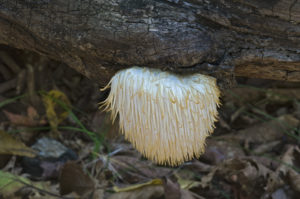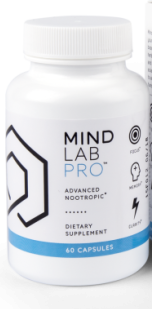Table of Contents
Lion’s Mane (Hericium erinaceus) is unique in the mushroom family both in appearance and function. Lion’s Mane Mushroom is extremely effective at stimulating Nerve Growth Factor (NGF) in the brain.
Known for its powerful effects as a “brain tonic”, Lion’s Mane is said to have been used as a tea for thousands of years by Buddhist monks. To enhance brain power, and heighten their ability to focus during meditation.
Lion’s Mane as a nootropic, is a powerful catalyst for brain cell regeneration helping improve memory and cognition.
The primary active compounds in Lion’s Mane are hericenones and erinacines. Erinacines help your brain produce more Nerve Growth Factor. Erinacines easily cross the blood-brain barrier to boost the production of neurons.
Lion’s Mane helps:
- Nerve Growth Factor. Lion’s Mane Mushroom prevents and treats nerve damage in the brain. Once past the blood-brain barrier, Lion’s Mane stimulates enzyme production that release Nerve Growth Factor (NGF). Nerve regeneration helps relieve neurodegenerative disease symptoms such as Alzheimer’s, dementia, and Parkinson’s Disease.
- Neurogenesis. Lion’s Mane stimulates the repair and creation of neurons. Boosting neurotransmitters and signaling that effects memory, learning, recall, and mood.
- Brain Optimization. Lion’s Mane helps eliminate brain fog. Restoring memory and mental alertness. And improves anxiety and depression symptoms.
Overview
Lion’s Mane (Hericium erinaceus) is a medicinal mushroom proven to benefit the brain, nerves and immune system.
Unlike other mushrooms sporting a cap and stem, Lion’s Mane has long, flowing, white tendrils. Resembling a lion’s mane. Other names include Monkey’s Head, Bearded Tooth, Pom Pom Blanc, Hedgehog Mushroom and Satyr’s Beard.

This parasitic fungus grows hanging off logs and trees. And is native to North American, Europe and Southeast Asia. In Japan, it’s called yamabushitake or “those who sleep in mountains”. Referring to the Shugendo sect of hermit monks and their long, flowing robes.
As a nootropic, Lion’s Mane has been shown to be particularly effective in stimulating Nerve Growth Factor (NGF) in the brain.
NGF is produced in the hippocampus throughout life. Modulating cholinergic receptors and neuroplasticity.[i] And is essential for learning.
Nerve Growth Factor are special proteins that function to regenerate neurons. Lion’s Mane contains two unique classes of NGF’s – hericenones and erinacines which easily cross the blood-brain barrier.
Lion’s Mane, like other medicinal mushrooms, contain high amounts of the antioxidant beta-glucoxylan and four other polysaccharides and polypeptides. Having a significant impact on enhancing your immune system. And decreasing tumor growth.
Lion’s Mane has also been studied in reducing amyloid plaques. These clumps of beta-amyloid proteins block signals between neurons. And are implicated in Alzheimer’s and other neurodegenerative diseases.
Lions’ Mane is also used to treat Lyme’s Disease, and digestive tract issues.
Here we’re talking about Lion’s Mane Mushroom and its effects on brain health and chemistry.
How does Lion’s Mane Work in the Brain?
Lion’s Mane boosts brain health and function in several ways. But two in particular stand out.
- Lion’s Mane Mushroom stimulates the synthesis of Nerve Growth Factor (NGF). NGF is a protein that plays a major role in the maintenance, survival and regeneration of neurons.
NGF is required by your brain to keep neurons strong and healthy. When various neurological disorders occur, your brain is unable to produce its own internal source of NGF.
In a study done in Kuala Lumpur in 2013, scientists showed that Lion’s Mane extract induced NGF synthesis and promoted neurite outgrowth.[ii]
- Lion’s Mane is effective in reducing anxiety and depression. Some even call it the “smart mushroom” for its ability to improve cognition, memory and work as an anti-depressant.
A study by researchers in Japan worked with 30 women. The female subjects had been complaining about menopause, depression, sleep quality and other issues.
The women randomly received Lion’s Mane-laced cookies or a placebo for 4 weeks. The researchers found that Lion’s Mane “has the possibility to reduce depression and anxiety, and these results suggest a different mechanism from NGF-enhancing action of H. erinaceus”. [iii]
How things go bad
Science once believed that the brain could not grow new brain cells. That once our brain developed during childhood, and we reached adulthood, we had all the brain cells we’d ever have.
Now we know that neurons can regenerate. But that doesn’t mean they will regenerate. A number of health issues can contribute to neurodegeneration.
↓ Decrease in Nerve Growth Factor = Decrease in Long-Term Potentiation affecting long-term memory[iv]
↓ Brain cells die and are not replaced
↓ Neuroplasticity declines resulting in poor memory
↓ Neurotransmitters decline resulting in anxiety, poor mood and depression
All of these age-related changes are contributing factors to neurodegenerative diseases like Alzheimer’s, Parkinson’s and others. And anxiety, depression and mood disorders that affect quality of life.
Lion’s Mane benefits
At least a dozen peer-reviewed studies have been published on Lion’s Mane benefits to brain health since 1991. Dr. Kawagishi of Japan was first to identify Nerve Growth Factor properties in Lion’s Mane Mushroom.[v]
In one double-blind, placebo-controlled trial, researchers in Japan worked with 50 – 80 year old men and women. All suffered from mild cognitive impairment.
The trial subjects received four 250 mg tablets containing 96% of Yamabushitake (Lion’s Mane) dry powder three times a day for 16 weeks. The men and women were tested at 4, 8, 12 and 16 weeks.
At each of the testing periods, the subjects who had used Lion’s Mane showed a significant improvement in cognitive scores. And their scores were increasing while on Lion’s Mane supplementation. But 4 weeks after stopping Lion’s mane supplementation, their cognitive scores decreased significantly.
The researchers concluded that Lion’s Mane Mushroom is effective in improving mild cognitive impairment.[vi]
How does Lion’s Mane feel?
You may not experience the effects of supplementing with Lion’s Mane Mushroom immediately. But many users report with continued use of Lion’s Mane, a boost in mood and mental energy.
 Some report it increases depth perception. And an improvement in sense of smell.
Some report it increases depth perception. And an improvement in sense of smell.
Others testify to improved decision-making, the ability to solve problems and learning. Likely due to Lion’s Mane ability to improve neuroplasticity.
The overall consensus is Lion’s Mane Mushroom’s ability to lessen anxiety, reduce depression, and improve concentration.
Lion’s Mane Clinical Research
Lion’s Mane Mushroom has been used as a food and herbal medicine since ancient times in East Asia. And it has been reported in scientific research that Lion’s Mane promotes Nerve Growth Factor both in the petri dish as well as in animal and human test subjects.
Lion’s Mane Prevents Cognitive Dysfunction
In this study, researchers examined the effects of Lion’s Mane on amyloid β(25-35) peptide-induced learning and memory deficits in mice. Amyloid β(25-35) peptide is implicated in diseases like Alzheimer’s.
Mice were injected with the peptide on days 7 and 14 of the trial. And they were fed a diet containing Lion’s Mane over 23-days of the experiment. The results showed that Lion’s Mane prevented short-term and visual recognition memory reduction normally induced by amyloid β(25-35) peptide.
They concluded that Lion’s Mane Mushroom “may be useful in the prevention of cognitive dysfunction”.[vii]
Lion’s Mane Induces Nerve Growth Factor
In this trial, mice were fed Lion’s Mane 5% freeze-dried powdered extract for 7 days. Researchers found an increase in the level of Nerve Growth Factor (NGF) in the hippocampus of the mice. Concluding that Lion’s Mane “contains active compounds that stimulate NGF synthesis”.[viii]
Lion’s Mane Repairs Nerves
In this study done with rats, Lion’s Mane extract was able to promote neuron regrowth after injury. Rats with gluteal nerve damage were able to walk again after consuming water containing Lion’s Mane extract.
The researchers concluded that Lion’s Mane regenerates damaged nerve cells. In this case, the reversal was so profound, the rats went from being totally disabled to walking again.[ix]
Lion’s Mane Dosage
Wondering how much Lion’s Mane to take? Dosing of Lion’s Mane Mushroom depends on the strength of the extract.
For Lion’s Mane 10:1 extract (30% polysaccharide), daily dosage is 500 – 1,000 mg taken 1 to 3 times per day. This means that if you choose a daily dose of 1,000 mg of Lion’s Mane extract, you should take 500 mg in the morning, and another 500 mg at noon.
Other retail extract dosage of Lion’s Mane ranges from 300 mg to 3000 mg dosed 1 – 3 times per day. Check the label and see what the manufacturer recommends. And when first using the supplement, start with the lowest dose and see how your body reacts.
Lion’s Mane Side Effects
Lion’s Mane Mushroom is non-toxic and considered very safe. So there are very few side effects reported.
Some neurohackers report itchy skin from higher doses. Likely attributable to a boost in Nerve Growth Factor.
Lion’s Mane has been tested in animals showing no side effects or toxicity even up to 5 grams per kilogram.
Best type of Lion’s Mane to buy
Lion’s Mane Mushroom (Hericium erinaceus) as a nootropic supplement is usually offered as an extract. In powdered form, or in a capsule.
 Lion’s Mane Mushroom can be found in some of higher quality pre-formulated nootropic stacks. For example, Click for Mind Lab Pro® contains 11 brain enhancing nootropic compounds including Lion’s Mane with the full fruit spectrum including hericenones and erinacines.
Lion’s Mane Mushroom can be found in some of higher quality pre-formulated nootropic stacks. For example, Click for Mind Lab Pro® contains 11 brain enhancing nootropic compounds including Lion’s Mane with the full fruit spectrum including hericenones and erinacines.
I recommend Mind Lab Pro® because it addresses all aspects of anxiety resistance, memory and cognitive enhancement, stabilizes mood, brain repair, and maintenance.
This premium nootropic stack is designed to affect neurotransmitters, cognitive energy, brain waves, neuroprotection, and regeneration. See my Mind Lab Pro review for a detailed report.
When choosing a Lion’s Mane supplement, there’s debate over the best form of extraction to achieve the mushroom’s full medicinal benefit. Some say your best option is a hot water extraction. Another says alcohol extraction. Another claims both are necessary.
But when it comes to mushrooms, saying that one is “more potent” than another is just too simplified to be true. This is as much an art as it is science.
Much more important is choosing a supplement that includes the mycelium of Lion’s Mane Mushroom. In this mushroom, the fruiting body does not contain erinacines which is the compound that boosts Nerve Growth Factor (NGF).
The nootropic benefits of hericenones only found in the fruiting body or top of the mushroom help support your immune system and get rid of Amyloid β(25-35) peptide implicated in diseases like Alzheimer’s.
The challenge is getting a Lion’s Mane Mushroom extract that contains the full spectrum found in both the mycelium and fruiting body. But the mushroom must be grown in liquid and not a solid substrate like grain. Otherwise you’ll get ground up grain without the important erinacines needed for increased NGF.
Look at the manufacturer’s literature and marketing material and find out how their Lion’s Mane is grown. And read the reviews on shopping sites as well as forums.
Types of Lion’s Mane available:
- Plain Lion’s Mane: Pure, powdered mushroom. Often freeze-dried, and the cheapest form available. Can be added to water, juice or smoothies.
- Lion’s Mane Extracts: A more potent form of mushroom. Often presented as 14:1 or 10:1 extracts (14 pounds or 10 pounds reduced to 1 pound of extract).
You will get 500 mg Lion’s Mane full spectrum extract in Click for Mind Lab Pro®
If you want a standalone Lion’s Mane Extract, I recommend Real Mushrooms organic Lion’s Mane Extract
- Standardized Lion’s Mane: Processed to provide exact levels of active ingredients. You can get Lion’s Mane standardized to 30% and 50% polysaccharides (including the active secondary metabolites hericenones and erinacines).
- Lion’s Mane tea: Since this is a popular mushroom in the kitchen, the taste is acceptable. But it’s hard to get a handle on how much actual active ingredient you’re getting.
- Amycenone®/PLM-Fraction: This “branded” product is standardized to Hericenones 0.5%, Amyloban 6%. It seems to target a lesser-known Lion’s Mane active ingredient–Amyloban–which is positioned as a mushroom compound that fights beta-amyloid proteins. Originating in Japan, it is extremely expensive, and may be found in a supplement called Amyloban®3399.
And if you decide to pick your own, before consuming any wild mushroom, make sure that it is accurately identified. Mushroom poisoning is a real problem if you pick the wrong one.
For a full list of Mycology societies that may be able to help you, go to the North American Mycological Association website (www.namyco.org).
Nootropics Expert Recommendation
Lion’s Mane 500 – 2,000 mg per day
 I recommend using Lion’s Mane as a nootropic supplement.
I recommend using Lion’s Mane as a nootropic supplement.
Your body does not make Lion’s Mane on its own. So you need to take it as a supplement.
Lion’s Mane is especially helpful for regenerating brain cells. It prevents neurodegenerative diseases like Alzheimer’s and Parkinson’s.
And it boosts long-term potentiation for memory and mental sharpness. By stimulating Nerve Growth Factor.
Lion’s Mane also helps boost mood, tame anxiety and relieve depression. For a better quality of life.
We suggest starting with a dose of 500 mg daily. The best human study used 3000 mg per day. But another researcher found lower concentrations may stimulate NGF better than higher concentrations.[x]
Start at 500 mg per day and see how it works for you. If you don’t experience a benefit, boost Lion’s Mane in small increments of 250 mg per day until you notice an improvement. And make sure you are using a supplement containing the mycelium and fruiting body that is grown in a liquid medium.
You can buy individual Lion’s Mane supplements. Or you could try my favorite pre-formulated nootropic stack Click for Mind Lab Pro® which includes the full spectrum including hericenones and erinacines found in Lion’s Mane Mushroom.
Mind Lab Pro contains a synergistic blend of 11 brain enhancing nootropics covering all aspects of cognition and brain health. See my full Mind Lab Pro review for more.
Lion’s Mane is a great compliment to a nootropic stack including Aniracetam, Alpha GPC and Omega-3’s for an immediate cognitive boost.








Join The Discussion - 408 comments
Renos
November 7, 2018
Hello David I love the job that you do and it’s really changing the life of me, my family, parents, friends and relatives. Please can you put references about the studies that you mention.
David Tomen
November 7, 2018
Renos, the references are as Roman numerals beside each study. Scroll to the bottom of the review to the “REFERENCES” section accordion. Click the arrow and all the clinical studies are there including “source” links to the original studies.
Victor
September 18, 2018
Thank you for the very insightful article on Lion’s mane. I have a question concerning the compound of lion’s mane. One product of Lion’s mane (Lion’s mane mushroom extract) that can be purchased online from a reliable seller is said to contain “40% whitanolides”. I find that a bit odd since nowhere did I see whitanolides being mentioned in association with lion’s mane. According to what I know, and also according to all other sources, including your article as well, lion’s mane contains polysaccharides, among other compounds, but not whitanolides, which are actually the main bioactive compound found in another adaptogen, Ashwagandha. Am I missing something? Or are whitanolides a compound which is also found in lion’s mane in some form? I’d appreciate your comment on this, Mr. Tomen. Thank you.
David Tomen
September 19, 2018
Victor, you are not “missing anything” and thank you for closely checking labels. Whitanolides are mostly found in the nightshade family of plants. And Lion’s Mane Mushroom is clearly not in the nightshade family. Either someone made a mistake in their label copy. Or are trying to full a “fast one” on the unwary supplement buyer.
Victor
September 19, 2018
Thank you for your reply and clarification! I contacted the seller prior to writing my comment here and, yes, they said a mistake was made because their graphic designer used the template for Aswagandha, which they sell as well, and forgot to change the ingredients; it’s supposed to be “40% polysaccharides”, not “40% whitanolides”. They said the mistake would be corrected as soon as possible.
CY
September 16, 2018
I forgot to ask can all these also effect her kidneys and liver? Shes diabetic and takes insulin and ecotrin. Also iron for anemia
CY
September 16, 2018
Hi
My mom has severe dementia. She screams non stop. Ive been trying several different supplements to try and help. Here they are
#1. Amyloban- 6 pills per day
#2. Lions mane powder by purity 30:1 concentrated. 1 teaspoon
#3 tonic tintures lion mane 1-3 squeezes of the bulb
All lions mane for protection and ngf
#4. Longvida optimized curcumin 400 mg by nootropics depot. 1 pill daily to tackle plaque 5. Panax notoginseng by health smart with 30% rg1 and 30% rb1 (bace 1 inhibitor) 2 pills daily
#6. Sensoril ashwaganda -10% withanolides by nootropics depot 1 or 2 pills daily
#7. Egcg- by swanson 90% ecgc 1 or 2 pills daily to tackle beta amyloid plaque
#8. Bulk supllements black coshosh powder (inhibitor y secretase) 800 mg daily
#9 nature botanicals ashwaganda 10:1 powdered extract. 1/4 teaspoon daily
Not given if i give the sensoril
And i just ordered synapse bacopa monierri might give two daily to cut down beta amyloid plaque
Im just kinda worried this all might be too much? Can all these thin her blood out and lower her blood pressure too much? And
David Tomen
September 16, 2018
CY, you should be OK using these adaptogens but I highly recommend checking out the side effects section for each of these individual reviews here on Nootropics Expert. You can scroll through the list and click through to the full review for each here: https://nootropicsexpert.com/nootropics-list/
Next, I suggest you do a general search of Nootropics Expert using the search function top right for the keyword “dementia” and then for “Alzheimer’s”. Lithium Orotate comes to mind as one way to calm outbursts in mood. You’ll also likely find that some of the very basics may help including certain vitamins and minerals.
Tim Eveland
September 1, 2018
I just bought some Lion’s Mane tablets and wanted to know how many I should take. Mine are 400 mg each so I think I’ll start with 2 per day and work my way up to 3 in a few weeks. Thanks for the info!
David Tomen
September 2, 2018
Tim, is the Lion’s Mane standardized? If not then definitely one 400 mg tablet twice per day. You can safely double that dose.
Marius Norheim
August 22, 2018
Is it safe to use small doses of valium and lions mane?
David Tomen
August 22, 2018
Marius, I’m not aware of any contraindications with Lion’s Mane and valium. Here is another way to check for potential interaction problems: https://www.drugs.com/drug_interactions.html
Natalie Wilson
July 23, 2018
David I have something called idiopathic intracranial hypertension. Would be great if you already know what this is but if you don’t and it’s too much CFS and the Brain causing extreme pressure which in turn causes cognitive issues with memory and such. The pressure also causes problems with vision do to deterioration of the optic nerves,which eventually can cause blindness. I have lost some peripheral vision but thank God I have not gone blind. However the excessive fluid has caused me to have cognitive issues with function and memory. I am desperate to find an alternative solution and then what the conventional doctors recommend. Their treatment is with usually two different kinds of medication one called Diamox he has her Topamax both have horrible side effects and also causes more loopiness. If those don’t work their next solution is to do a brain shunt which is basically put into the brain to drain the fluid which then is drained by a tube into your stomach. I am looking for an alternative. Doctors don’t know why there is too much CSF fluid being produced in the brain and seems they have no care to find out why. Their approaches very textbook and seems they must receive a lot of money for shunt surgery as that is always the end result for all these poor people that have this. I refuse to go that route and I am looking for Alternatives and that’s why I am here. Lion’s mane looks like a great solution to the memory and the cognitive issues but can you suggest anything else maybe for the optic nerves and for the excessive CSF fluid?
David Tomen
July 23, 2018
Natalie, Lion’s Mane may be a good option to start. Keep in mind that I’m not a doctor so please do your own research on each of these suggestions. And make sure they do not interact with any meds or other supplements you are using.
Ashwagandha is one option: https://nootropicsexpert.com/ashwagandha/, and
Bacopa Monnieri is another: https://nootropicsexpert.com/bacopa-monnieri/.
The best supplement combination I’ve ever used for eye and vision health is here: https://nootropicsexpert.com/performance-lab-vision-review/
Kathy Oliveiro
July 19, 2018
Hi David,
i have purchased the Lions Mane powder extract and i have started to take 1/4 teaspoon twice daily. Would you have any idea how much this would be in milligrams? I’m just not sure if I’m taking enough.
Thanks for your help.
Kathy
David Tomen
July 19, 2018
Kathy, the only way to know exactly how much in mg of Lion’s Mane your getting from that powder is to get it tested in a lab.
It’s the reason I prefer extracts from reputable companies. Or patented products by reputable companies that are supported by clinical trials.